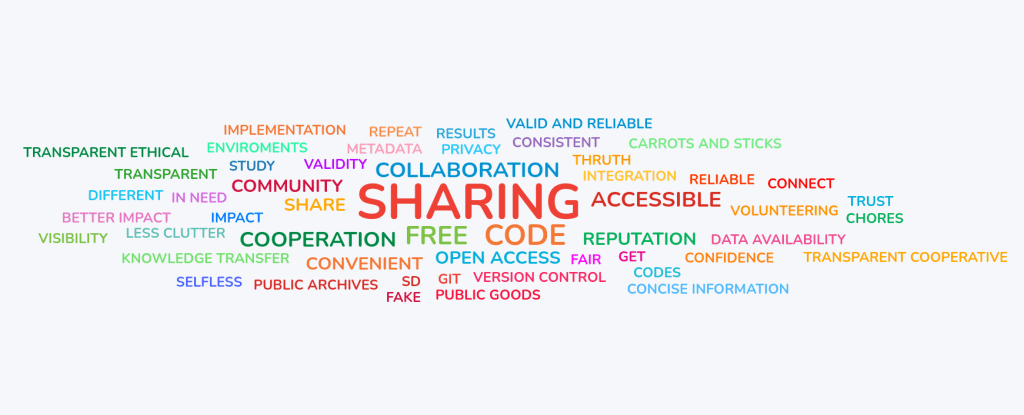Open Consultation on the NPOS2030 Ambition Document – response on behalf of 4TU.ResearchData

Below if the response submitted by 4TU.ResearchData to the Open Consultation on the NPOS2030 Ambition Document. Consultation documents:
1. To what extent do you agree with the NPOS Guiding Principles?
- Agree
2. Do you have comments or suggestions for this element of the Ambition Document?
4TU.ResearchData appreciates the opportunity to provide input on the NPOS2030 Ambition Document. We observe that this is in full agreement with the principle of transparency and inclusiveness.
Overall, 4TU.ResearchData is in full support of the NPOS Guiding Principles. Our comments and questions are about the implementation of these principles: how these will be reflected in the governance of the national ambition, and also how these will translate into specific action lines and funding for these activities.
Specific comments about the principles:
1. Open as early as possible and protected when necessary
How does this principle apply to research outputs produced by for profit organisations? They are also an important stakeholder when it comes to societal impact. To set the ambition for 2030, this document should not shy away from proposing a process to agree on expectations for for profit organisations and also for public-private partnerships. Such a process should be inclusive of relevant stakeholders outside of academia.
On a smaller note, what is the rationale for deviating from the “as open as possible, as closed as necessary” broadly adopted by the community to “Open as early as possible, and protected when necessary”?
2. Subsidiarity: each organisation implements Open Science within their local organisation and infrastructure in line with (inter)national guidelines on Open Science, in a federated fashion
What is the exact vision for the implementation of this principle? Should this principle be applied to all programme lines?
The development, implementation and maintenance of open infrastructures is certainly in-line with the subsequent principle “Academic and digital sovereignty must be safeguarded via concerted action in the interest of transparent, inclusive and reliable knowledge creation”. However, it is essential to work together and share infrastructures to make it scale. Also, a concrete plan and ambition are needed to make this happen. Ongoing investment is needed to support open infrastructures (see the report “Scoping the Open Science Infrastructure Landscape in Europe”: https://doi.org/10.5281/zenodo.4159838). Given that there is no funding attached to the current Ambition Document, it is difficult to understand how this principle will be realised.
3. We stand for inclusiveness and invite all stakeholders to contribute
4TU.ResearchData fully supports this principle. However, it is not clear how this principle will be translated into governance structure. Inclusive governance is key for upholding this principle.
Smaller comments:
- The requirement “Make Open Science normative through active Community Engagement” seems to be limiting the paramount role of community engagement in enabling open science only to Open Science Communities. Various professionals also need their peer networks and communities, similarly to domain and discipline-specific communities. So the scope there needs to be broadened.
- The map of NPOS stakeholders in figure 2 is missing 4TU.ResearchData and RDNL.
3. To what extent do you agree with the NPOS Vision for 2030?
- Neither agree nor disagree
4. Do you have comments or suggestions for this element of the Ambition Document?
While the vision sets an overall direction for the future, it is a bit unclear how this vision will be implemented. For example, the vision statement mentions that ‘journals will change form and format’, but there is no further elaboration on what the desirable form and format should be in 2030. The vision should also set out a strategy for implementation, which is at the moment unclear, especially since it is unclear whether there is any funding attached to the ambition.
The vision aims at making “all digital forms of scholarly output” FAIR (page 10). However, it is unclear why the Ambition Document focuses so much attention on Open Access, FAIR Data and Citizen Science, but not on other elements of Open Science.
The document even reads “There are many more important aspects on Open Science, such as Open Education, Research Integrity and Reproducibility of scientific results. Some of these topics have already been taken up by partners in the scientific community. Others are relatively new: we have to see how they develop and how they are related to other topics. In the upcoming period we will evaluate our progress, monitor new developments, and accordingly update our activities to achieve our goals”. The Netherlands should do better than waiting and seeing what happens if it wants to be seen as a leader in the implementation of Open Science. Even if there are some parallel efforts to address some issues (there is an explanation provided that Open Education needs are being addressed as part of The Acceleration Plan for Education Innovation with IT), a national strategy is still needed to ensure that these efforts are aligned.
As a minimum, the strategy should dedicate explicit attention also to Research Software. Software is essential for research nowadays, as a tool for reproducible data processing, but also as a scientific output itself. The accomplishment of FAIR data needs FAIR software.
Small notes:
- It would be helpful if on page 10 there was also a reference to the FAIR principles on the FORCE11 website (as agreed by the community) in addition to the reference to the Lorentz workshop in 2014 where these were conceived.
- What is meant by an ‘Open Access license’ in the sentence “Moreover, as much as possible, scholarly output should be made available under an Open Access license”?
5. To what extent do you agree with the NPOS Programme Lines and the Requirements?
- Neither agree nor disagree
6. Do you have comments or suggestions for this element of the Ambition Document?
Again, 4TU.ResearchData firmly believes that the scope of the current three programme lines: Open Access, FAIR Data and Citizen Science need to be extended to other Open Science topics.
The vision explains that “the decision to work with a Rolling Agenda in the coming decade will ensure the Programme is updated whenever new themes and challenges occur” and also that “the Steering Board coordinates the Programme and its Programme Lines, and the actions outlined in its Rolling Agenda. It facilitates feedback from and interactions between key stakeholders across the Dutch scientific community and monitors the alignment of the Open Science activities in The Netherlands with similar initiatives elsewhere in Europe”. However, recognition of other aspects of Open Science (thus broader than just Open Access, FAIR Data and Citizen Science) has already taken place in Europe and also in Dutch academic institutions which have more diverse and more inclusive programmes than depicted in the NPOS2030 Ambition Document.
Research software in particular needs more attention within the Ambition Document. Currently, software seems to be seen as a tool to support data analysis. However, research software is a scholarly output in its own right, similarly to research data or publications. Furthermore, FAIR principles cannot be simply applied to software – they need adaptation for this to happen. As explained in the report of the FAIR WG of the European Open Science Cloud (Six Recommendations for Implementation of FAIR Practice) “…Software is different from data: it is a tool to do something (executable); it is built by using other software (implements multi-step process, coordinates multiple tasks), it has complex dependencies and has a short life cycle with frequent need of versioning (including dependencies). Some of these characteristics also apply to data. However, the variety of software and its publishing and distribution channels, and the necessity to document dependencies and describe data formats, poses a challenge when adapting the current FAIR principles.” Therefore, it is essential that there is dedicated effort to tackle these issues.
The vision rightfully states that the implementation of the NPOS Programme Lines will be done in close alignment in order to “synchronise activities and to build on each other’s progress”. However, it is unclear how this will happen. How will this desire translate to governance structure facilitating such synchronisation? The programme lines currently feel rather disconnected.
For example, ambitions related to research infrastructure should be handled holistically to identify synergies and avoid duplication of efforts. Instead, the Citizen Science programme line aims to “Develop and Invest in Supporting Infrastructures” and there seem to be no cross-connection or references to the relevant action line of the FAIR Data programme: “Services and infrastructures: enable sustainable interoperable networks of FAIR Data services and research infrastructures at the domain level, institutional level, and national level“.
Similarly, the ambitions of the programme line on Open Access does not seem to take into account the needs of other programmes. For example, publishers should make the links between publications and other outputs explicit in metadata and they should follow the advice of international expert groups (such as the RDA Scholix Working Group, JATS4R recommendations on Data Citation, or the newly launched NISO group developing recommendations for integrating publishers and repository workflows). This should be a requirement when signing any new deals with publishers.
The link between the guiding principles and the requirements for Open Science is unclear. Most of the requirements appear to be high level principles or ambition statements. What is the role of both? How do they translate to programme lines and key actions? For example, the fourth requirement “Make Open Science rewarding through incentives (Recognition & Rewards)” (page 13) is very important and is indeed a vehicle for much needed cultural change. However, it is not clear how this requirement translates to specific actions within the programme lines.
7. To what extent do you agree with the NPOS Key Lines of Action for the Programme Lines?
- Neither agree nor disagree
8. Do you have comments or suggestions for this element of the Ambition Document?
The main reservation which 4TU.ResearchData has towards the programme line is their lack of inclusivity to other aspects of Open Science. However, we are broadly in agreement with the specific action lines of the three programmes. Our comments highlight specific areas for improvement within the key actions of the three programme lines.
Open Access
Action lines in this programme line would benefit from better articulation of specific objectives and tasks. For example, the action line “Maintaining high quality and research integrity” seems to be a list of observations and reflections on the current situation and what should change, but doesn’t propose any specific actions to tackle these problems. Similar issues are observed with some other actions, e.g. “Novel ways of Recognition & Rewards, away from quantitative measures “ and “Control over ownership, public values, and academic and digital sovereignty”. Another example, there is an ambitious statement that “We will establish a sustainable, innovative open publishing-infrastructure for all scholarly data”. What exactly is meant here? Who will build this, how, when and what are the plans for sustainable financing?
4TU.ResearchData finds it rather confusing that action lines 4-6 (4. Maintaining high quality and research integrity; 5. Novel ways of Recognition & Rewards, away from quantitative measures; 6. Control over ownership, public values, and academic and digital sovereignty) are listed as only applicable to the Open Access programme line. We believe that these action lines should also apply to FAIR Data and Citizen Science programme lines.
Small comments:
- What is meant by ‘scholarly data’ in “We will establish a sustainable, innovative open publishing-infrastructure for all scholarly data”?
FAIR data
4TU.ResearchData supports the Mission and Ambition of the FAIR Data programme line, as well as the individual actions.
One reservation that we have is that the FAIR Data programme line seems to be focusing primarily on the ‘use’ and ‘reuse’ of research data and the suitability of FAIR data. The key aspects of research integrity and research reproducibility are currently missing. This is also one of the primary drivers for FAIR Data and not recognizing this clearly is a miss. Note that the VSNU code of conduct for research integrity mentions the word ‘data’ over 40 times.
In addition, 4TU.ResearchData wanted to express disappointment about the lack of references to 4TU.ResearchData in the NPOS document overall, but within the FAIR Data Programme line in particular. 4TU.ResearchData is an important infrastructure and expertise centre in the domain of science, engineering and design, and has not only national, but also an international scope. A representative of 4TU.ResearchData is part of the team leading the formation of the thematic DCC for natural and engineering sciences. Members of 4TU.ResearchData have also contributed to the first line of action of the FAIR Data programme line. We hope that the contribution that 4TU.ResearchData makes to the national open science landscape will be better reflected in the subsequent version of this document.
Small comment:
- Research Software Engineers are a separate profession to the data stewards. As such, they should not be mentioned under “Capacity building: create a professional community of skilled data stewards”.




